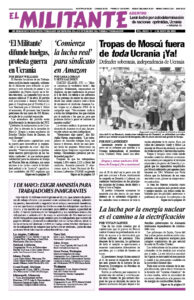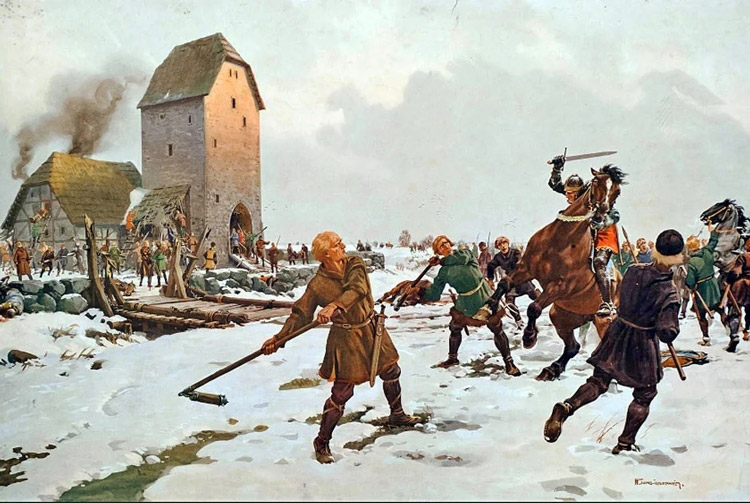The Challenge of the Left Opposition (1928-29) by Leon Trotsky is one of Pathfinder’s Books of the Month for April. The book documents the opposition led by Trotsky in the Soviet Communist Party to defend the proletarian and revolutionary internationalist course of V.I. Lenin, the central leader of the 1917 Bolshevik Revolution, against a rising bureaucratic counterrevolution led by Joseph Stalin. This included the fight to advance the worker-peasant alliance and overcome national oppression by defending the right to self-determination. Below is an excerpt from “Philosophic Tendencies of Bureaucratism.” Copyright © 1981 by Pathfinder Press. Reprinted by permission.
What is Marxism? Let us review once again its main elements.
First of all, the dialectical method. [Dialectics considers the world in its movement and changes, interrelations and development, the process of becoming and withering away, to discover its laws of motion.] [Karl] Marx was not its originator and of course never pretended to be. [Frederick] Engels felt that it was the merit of Marx that he revived and defended dialectics at a time of epigonism in philosophy and of narrow empiricism in the positive sciences. Engels in the “Old Preface” to Anti-Dühring said the following: “It is the merit of Marx that, in contrast to the ‘peevish, arrogant, mediocre epigonoi (epigones) who now talk large in cultured Germany,’ he was the first to have brought to the fore again the forgotten dialectical method” …
Marx was able to accomplish this only by freeing dialectics from idealist captivity. Here there is an enigma: How is it possible to separate dialectics from idealism in such a mechanical way? The answer to the enigma in turn lies in the dialectics of the cognitive process itself. Whenever primitive religion or magic acquired new knowledge about some force of natural law, it immediately numbered that law or force among its own powers. In the same way cognitive thought, having extracted the laws of dialectics from the material process, attributed dialectics to itself; at the same time, through Hegelian philosophy, it assumed absolute omnipotence for itself. … Hegel erred in making dialectics an immanent attribute of absolute Spirit. But he was right that dialectics holds sway in all processes of the universe, including human society.
Basing himself on all preceding materialist philosophy and on the unconscious materialism of the natural sciences, Marx led dialectics out of the barren wastelands of idealism and turned its face toward matter, its mother.
It is in this sense that dialectics, restored to its rights by Marx and materialized by him, constitutes the foundation of the Marxist view of the world, the fundamental method of Marxist analysis.
The second most important component of Marxism is historical materialism, that is, the application of materialist dialectics to the structure of human society and its historical development. It would be wrong to dissolve historical materialism into dialectical materialism, of which it is an application. For historical materialism to be applied to human history, a very great creative act by cognitive thought was necessary. That act opened up a new epoch in the history of humanity itself, the class dynamics of which it reflected in itself.
It can be said with full justification that Darwinism is a brilliant application — though one that, philosophically, was not thoroughly thought out — of materialist dialectics to the question of the development of the organic world in all its multiplicity and variety. Historical materialism falls into the same category. It is an application of materialist dialectics to a distinct, although enormous, part of the universe. The immediate practical importance of historical materialism is at this time immeasurably greater, since for the first time it provides the vanguard class with the opportunity of approaching the question of human destiny in a fully conscious way. …
The third component part of Marxism is its systemization of the laws of capitalist economy. Marx’s Capital is an application of historical materialism to the realm of human economics at a particular stage of its development, just as historical materialism as a whole is an application of materialist dialectics to the realm of human history. …
The historical and theoretical economics of Marx shows that the development of the productive forces at a definite, exactly describable phase destroys certain economic forms with other forms and in the process disrupts law, morals, views, beliefs; it shows also that the introduction of a system of productive forces of a new and higher type creates for its own needs — always through people, through the agency of human beings — new social, legal, political, and all other norms, in the framework of which this stage provides itself with the dynamic equilibrium it requires. Thus, pure economics is a fiction. …
But at the same time it would be absolutely wrong to simply dissolve the economic system of Marx into his sociological — or, to use the old terminology, his historico-philosophical — theory. In relation to historical materialism Marx and Engels established the fundamental methods for sociological research … works primarily devoted to revolutionary crises or revolutionary periods in history — for example, Engels’s essay on the peasant war in Germany, the writings of both men on the period 1848-51 in France, the Paris Commune, and so on. These writings are brilliant illustrations rather than exhaustive applications of the doctrine of historical materialism. Only in the field of economic relations did Marx provide a more thorough application of his method in theoretical respects … in a book that is one of the most accomplished products of cognitive thought in human history — Capital. …
Marxism does not pretend to be an absolute system. It is aware of its own historically transitory significance. Only a conscious application of materialist dialectics to all fields of science can and will prepare the elements necessary for the transcending of Marxism, which dialectically will at the same time be the triumph of Marxism. …
In itself Marxism is a historical product and it must be grasped that way.


